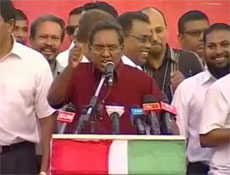Police have begun investigating opposition Maldivian Democratic Party (MDP) MP Imthiyaz ‘Inthi’ Fahmy for allegedly making “contemptuous remarks” against the judiciary, during a TV program broadcast by opposition-aligned television station Raajje TV.
Fahmy told Minivan News that police called him on Wednesday and informed him that the case was being investigated on the judiciary’s request.
However police media official Sub-inspector Hassan Haneef said he was “unsure” whether police were currently investigating the matter, but said cases concerning contempt of court previously been investigated and sent for prosecution.
Police sent a case concerning Imthiyaz Fahmy for prosecution in June 2012, requesting he be charged with disobeying orders, obstructing police duty and physically assaulting a female police officer during an MDP demonstration on May 29, that had followed the dismantling of the party’s protest camp at Usfasgandu.
In a subsequent statement condemning “excessive use of force” against demonstrators, Amnesty International staed that according to Fahmy, “police in Dhoonidhoo told him he was arrested for ‘disrupting peace’.”
The next day in court, police stated that he had been detained for ‘physically attacking a woman police officer.”
Fahmy denied the charges pressed against him by the prosecution.
Regarding the new police investigation, Fahmy claimed the judiciary was attempting to silence elected members of the public and that allegations of contempt of court were a facade.
“People elected me to find faults in institutions such as the courts find ways to reform them, to correct those faults. I have been elected as a member of parliament by the people to talk about such issues and that is my responsibility. It is a duty vested in me by the people and I will remain firm in executing that duty,” Fahmy told Minivan News.
He further claimed that discrepancies and flaws within the courts were already being widely discussed by the general public.
“The courts themselves do not comprehend the real meaning of the concept of judicial independence,” he claimed.
“They should also understand that dignity and honour is not a one-way train. It goes both ways. Their actions should be of a standard and performed in a transparent fashion so as to have dignity.”
In a statement issued during her visit to the Maldives in February 2013, United Nations Special Rapporteur (UNSR) on Independence of Judges and Lawyers Gabriela Knaul stated that she had found that the concept of independence of the judiciary has been “misconstrued and misinterpreted” by all actors, including the judiciary itself, in the Maldives.
“The requirement of independence and impartiality does not aim at benefiting the judges themselves, but rather the court users, as part of their inalienable right to a fair trial,” Knaul stated in her concluding statement.
Beyond Knaul, Fahmy noted that several other international experts on judicial independence, including International Commission of Jurists (ICJ), judicial expert Professor Paul H Robinson, United Nations Human Rights Committee (UNHRC) as well as the report by the Commission of National Inquiry (CNI) – which was set up to look into the legality of the controversial ascension of President Mohamed Waheed Hassan to presidency on February 2012 – had highlighted “serious flaws” within the judiciary.
“The first thing is that the judges were wrongfully reappointed. The constitutional provisions indicate that the judges were appointed by the Judicial Service Commission (JSC) wrongly without proper consideration being given to Article 285 of the constitution. That is unconstitutional,” he added.
Fahmy – who is a lawyer himself – claimed that other powers of the state including the legislature and the executive had been set up in accordance with the 2008 constitution and that it was only the courts and the judiciary that had failed to be established in accordance with the new constitution.
“Am I being punished for coming out and speaking the truth? What is so wrong in me reiterating the same facts that are being highlighted by several respected international authorities on the same issue?” he questioned.
Apart from Fahmy, cases against several other MDP MPs are either being currently investigated or being heard in the courts including that of MP Ali Waheed (the party’s Deputy Parliamentary Group Leader), MP Hamid Abdul Ghafoor (the party’s spokesperson for international affairs), MP Abdulla Jabir, MP Mohamed ‘Matrix’ Rasheed and MP Ibrahim ‘Bondey’ Rasheed.
Charges faced by the MPs include contempt of court, obstruction of police duty as well as offence of consumption of alcohol. According to the constitution, a member of parliament loses his seat should he be convicted of a criminal offense that requires serving a sentence longer than a period of 12 months.



